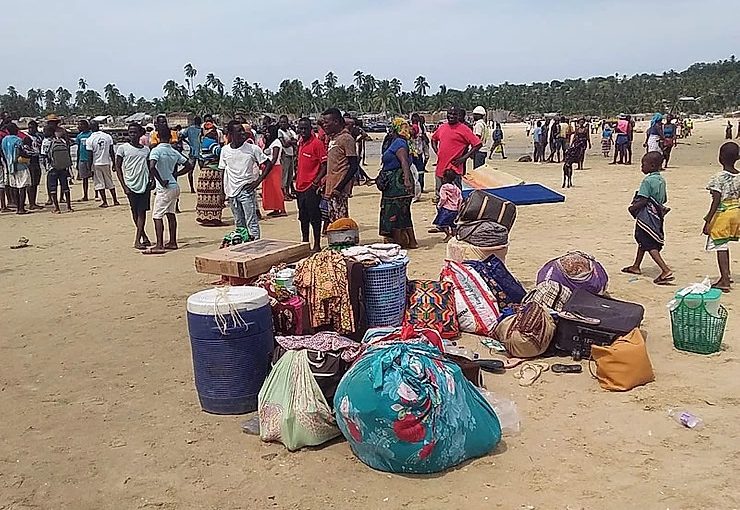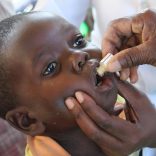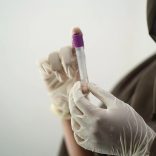Mozambique. Cholera vaccination planned for 1.7M people in five days in Nampula
CDD: Withdrawal of humanitarian aid agencies increases vulnerability of population and risk of youth recruitment – Unabridged

Photo: Moz24h
As the world focuses on preventing and combating the Covid-19 pandemic, a new humanitarian crisis is gaining ground in Cabo Delgado, where thousands of people fleeing terrorist attacks are risking their lives at sea to reach relatively safe areas. Most of the displaced people are leaving the towns of Mocímboa da Praia and Quissanga, recently attacked by terrorists, and their main destination is the city of Pemba, until now the safest place in the province.
Those who cannot pay between 1,000 and 1,500 meticais for a trip by sea, remain in danger zones, abandoned by the state and by humanitarian agencies and organisations that have suspended their activities and removed all personnel who worked in the districts most affected by the attacks. For now, there are reports of at least three children drowning while trying to cross the sea between the town of Quissanga and the Quirimbas archipelago.
The images of the migratory crisis in the Mediterranean that shocked the whole world recently can now be seen again, on a smaller scale, off the coast of Cabo Delgado. If in Europe the main landing point was the Italian coast, in Cabo Delgado it is the bay of Pemba, specifically Paquitequete beach. This is where hundreds of displaced persons, especially women and children, disembark daily, carrying the few goods that escaped the plunder of the terrorists.
The trips are made in sailing boats that do not offer security, and can last up to two days. “The boat trip from Mocímboa da Praia to Pemba lasts two days, and I usually transport more than 100 people at a time,” sailor Abacar Ismail confirmed to the Centre for Democracy and Development (CDD). The number of people transported in each voyage clearly shows that the boats sail overcrowded, a situation that increases the risk of tragedy off the Cabo Delgado coast.
“Between 10 and 15 boats arrive each day with about 500 people,” says Aifo Corrente, Head of Unit C in the Paquitequete neighbourhood. He is the only official who daily records the displaced people who land on Paquitequete beach. The state is virtually absent and humanitarian aid agencies have withdrawn from Cabo Delgado. As a result, there is no centre for displaced people, there is no support, neither logistical nor food, there is no guidance on how those desperate people may protect themselves from Covid-19.
In fact, the pandemic that menaces people across the world and shuts them in their homes is less of a problem for those who have to protect themselves, alone and without the defence of the state, from the terrorist attacks that have already killed more than 600 people, according to parallel surveys. For this reason, the main concern of people arriving from the towns of Mocímboa da Praia and Quissanga is to find a safe shelter in the city of Pemba: at the home of a family member, a friend or solidary person. Others continue their journey by land to the southern districts of Cabo Delgado and to Nacala, in the province of Nampula.
Risk of recruiting young people increases due to the suspension of humanitarian aid in times of crisis
After the assault on the towns of Mocímboa da Praia and Quissanga last week, agencies and organisations providing humanitarian support to the victims of Cyclone Kenneth and the armed attacks suspended their activities and removed all personnel who worked in the central and northern districts of Cabo Delgado. The main argument for the suspension of humanitarian aid is the environment of insecurity on the ground, a situation aggravated by the weak response capacity of the Defence and Security Forces (FDS).
In the meantime, the withdrawal of humanitarian agencies has increased the vulnerability of thousands of families who have lost their assets and livelihoods due to Cyclone Kenneth, which devastated the coast of Cabo Delgado in April 2019. Without the possibility of pursuing agriculture or fishing because of the armed attacks, these families depend entirely on humanitarian aid for their survival.
In addition to food, humanitarian agencies provided basic health care to thousands of people in an area where most health centres were destroyed by Kenneth, and where the few health units that survived the cyclone remain closed after being vandalised and looted by terrorists.
Without food and a functioning health network, thousands of people from the districts of Mocímboa da Praia, Macomia and Quissanga have become even more vulnerable to diseases such as Covid-19, and lack even the minimum conditions for complying with the restrictive measures announced within the scope of the State of Emergency.
The withdrawal of humanitarian agencies also increased the risk of young people being recruited by the terrorists operating in Cabo Delgado. Abandoned by the state and with no prospect of a better future, many young people have become vulnerable to any kind of enticement and may easily fall into the hands of terrorist groups. In fact, terrorists have already realised the security, social and economic weaknesses of their victims, and are investing everything in winning the population’s sympathy and acceptance.
It was no accident that when they occupied the towns of Mocímboa da Praia and Quissanga, they did not kill civilians, but arranged gatherings of local residents, distributed food, and received a heroes’ farewell when they left. For this reason, the CDD argues that this, more than ever, is the moment when humanitarian agencies and organisations should intensify actions to support the victims of Cyclone Kenneth and the armed attacks in Cabo Delgado.
In light of the African Union Convention on the Protection and Assistance of Internally Displaced Persons in Africa (Kampala Convention), the responsibility for preventing internally displaced persons, protecting and assisting displaced persons and finding lasting solutions lies primarily with the states concerned. But in situations where the state is unable or unwilling to effectively comply with such obligations, the Kampala Convention advises the government concerned to facilitate assistance from the African Union, international organisations and humanitarian agencies.
The CDD does not discount the Mozambican state’s responsibilities towards the victims of the armed conflict in Cabo Delgado, but is calling on humanitarian organisations and agencies to continue to support families to avoid a major humanitarian crisis.
Suspending humanitarian aid at a time of crisis such as this not only increases the vulnerability of abandoned people, but also offers greater scope for terrorists to act. It won’t be surprising if, after the Covid-19 pandemic, the world wakes up to finds a big part of Cabo Delgado province in the hands of the terrorists.












Leave a Reply
Be the First to Comment!
You must be logged in to post a comment.
You must be logged in to post a comment.